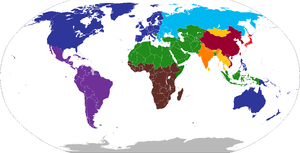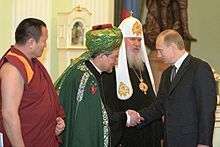Anti-Western sentiment
Anti-Western sentiment, also known as Anti-Atlanticism, or Westernophobia refers to broad opposition, bias, or hostility to the people, Western culture or policies of the Western World.[2][3]

Definition and usage
In many modern cases, anti-western sentiment is fueled by anti-imperialism, particularly against countries that are "all are deemed guilty for the colonial crimes of the past and present" such as Germany, the UK and the Netherlands. Anti-Western sentiment occurs in many countries, even from the West itself – especially European countries. Broad anti-Western sentiment also exists in the Muslim world against Europeans and the United States. The hatred against the United States stems from their support for Israel, the seizure of Iraq and the numerous sanctions on Iran.[4]
After the end of the Cold War, Samuel P. Huntington argued that international conflict over economic ideology will be replaced with conflict over cultural differences.[1] He argues that economic and political regionalism will increasingly shift non-Western countries towards geopolitical engagement with countries that share their values. Huntington argues that the Islamic world experiencing a population explosion at the same time as a growth in Islamic fanaticism, leading to rejection of Westernization.
Africa
Africa is an example post-colonial societal collapse where the loss of colonists striving to build a new nation has left behind nations unable to maintain their current trajectory of development or even their current state of affairs. There are many conflicts currently playing out in Africa, similar to the Middle East.
Asia
China
Anti-Western sentiment in China has been increasing since the early 1990s, particularly amongst the Chinese youth.[5] Notable incidents which have resulted in a significant anti-Western backlash have included the 1999 NATO bombing of the Chinese embassy in Belgrade,[6] the 2008 demonstrations during the Olympic torch relay[7] and alleged Western media bias,[8] especially in relation to the March 2008 Tibet riots.[9] Whilst available public opinion polls show that the Chinese hold generally favourable views towards the United States,[10] there remains suspicion over the West's motives towards China[10] stemming largely from historical experiences and specifically the 'century of humiliation'.[11] These suspicions have been increased by the Communist Party's "Patriotic Education Campaign".[12]
Japan
There is a history of criticism of the so-called West within the history of thinking in the culture of Japan.[13]
India
Anti-western sentiments were common at one point in Colonial India during the Indian independence movement.[14]
Singapore
Lee Kuan Yew, the former Prime Minister of Singapore, argues that East Asian countries such as China, Japan, Korea and Vietnam should be based on "Asian values".[15] Countries such as the Four Asian Tigers should aspire to have Western-style standards of living, but without accepting liberal democratic social institutions and principles.
Middle East
Islamism
John Calvert writes that in their critique of the West the Islamists use Western thinkers like Alexis Carrel, Oswald Spengler, Arnold J. Toynbee or Arthur Koestler.[16]
Terrorist groups Al-Qaeda and ISIS are both anti-western, and promote terrorism in Western countries.[17]
Arab world
"America thinks of modernity as all good — and it has been almost all good for America. But for the Arab world, modernity has been one failure after another. Each path followed — socialism, secularism, nationalism — has turned into a dead end."[18]
Europe
Netherlands
In Amsterdam's secondary schools, about half the students of Moroccan descent do not identify with the Netherlands: they see their identity as 'Muslim', and regularly express anti-Western views but, nevertheless, do not want to return to their ancestral homeland.[21]
Russia

Anti-Western sentiment in Russia dates back to 19th century from an intellectual debate between Westernists and Slavophiles. While the former deemed Russia to be a lagging Western country, the latter rejected these claims outright and dubbed West to be 'rotten'. An important figure in Western criticism under reign of Alexander the Third was Konstantin Pobedonostsev, a former liberal who eventually denounced and thoroughly criticised his former views.
Under the Communist rule 'the West' eventually became synonymous with 'the capitalist world', resulting in appearance of famous propagandist cliché 'corrupting influence of the West'.
After Cold War, a number of politicians in the Russian Federation have supported an explicit promotion of Russian Orthodox traditionalism, and a rejection of Western liberalism.
Some ultra-nationalist politicians, such as Vladimir Zhirinovsky, an anti-communist, express the most anti-Western sentiment.
Vladimir Putin has promoted explicitly conservative policies in social, cultural and political matters, both at home and abroad. Putin has attacked globalism and neoliberalism,[22] and promoted new think tanks that stress Russian nationalism, the restoration of Russia's historical greatness, and systematic opposition to liberal ideas and policies.[23] Putin has collaborated closely with the Russian Orthodox Church. Patriarch Kirill of Moscow, head of the Church, endorsed his election in 2012 stating Putin's terms were like "a miracle of God."[24][25] The Russian Orthodox Church sometimes is host to groups that promote nationalist and anti-Western tendencies.[26][27]
The Russian government has restricted foreign funding of some pro-liberal Non Governmental Organizations. Pro-Russian activists in the former Soviet Union frequently equate the West with homosexuality and the gay agenda,[28] and Russian gay propaganda law was welcomed by nationalist and religious political figures in Russia as a bulwark against Western influence.[29]
The Yarovaya Law prohibits evangelism by religious minorities, which was used to ban the U.S.-based Jehovah's Witnesses.[30]
See also
- Anti-Americanism
- Anti-British sentiment
- The Clash of Civilizations
- Criticism of Western culture
- Discrimination in Europe
- Globalization
- Active measures
References
- Huntington, Samuel P. (1 June 1993). "The Clash of Civilizations?". Foreign Affairs.
- "Definition of ANTI-WESTERN". www.merriam-webster.com. Retrieved 30 November 2018.
- "anti-Western | Definition of anti-Western in English by Oxford Dictionaries". Oxford Dictionaries | English. Retrieved 30 November 2018.
- Abdul-Ahad, Ghaith (14 September 2012). "Anti-western violence gripping the Arab world has little to do with a film". the Guardian. Retrieved 22 August 2018.
- "Anti-western sentiment flourishes in China". ABC. 24 April 2008. Retrieved 8 June 2009.
- Peter Hays Gries (July 2001). "Tears of Rage: Chinese Nationalist Reactions to the Belgrade Embassy Bombing". The China Journal. Canberra, Australia: Contemporary China Center, Australian National University. 46 (46): 25–43. doi:10.2307/3182306. ISSN 1324-9347. JSTOR 3182306. OCLC 41170782.
- "Protests against 'Tibet independence' erupt in cities". China Daily. 19 April 2008. Retrieved 23 May 2009.
- "Looking past Western media bias against China". China Daily. 28 February 2008. Retrieved 7 June 2009.
- Bristow, Michael (25 March 2008). "China criticises Western media". BBC News. Retrieved 7 June 2009.
- "Hope and Fear: Full report of C-100's Survey on American and Chinese Attitudes Toward Each Other" (PDF). Committee of 100 with assistance from Zogby International and Horizon Research Consultancy Group. 2008. Archived from the original (PDF) on 9 November 2008. Retrieved 8 June 2009.
- Peter Ford (17 April 2008). "Chinese vent anti-Western fury online". The Christian Science Monitor. Retrieved 8 June 2009.
- Zhao, Suisheng: "A State-led Nationalism: The Patriotic Education Campaign in Post- Tiananmen China", Communist and Post-Communist Studies, Vol. 31, No. 3. 1998. pp. 287–302
- Aydin, Cemil (9 July 2007) - The Politics of Anti-Westernism in Asia: Visions of World Order in Pan-Islamic and Pan-Asian Thought Columbia University Press pp. 1–2 ISBN 0231510683 part of Columbia Studies in International and Global History Accessed 1 July 2017
- "Anti-Western alliance". amp.dw.com.
- "Human Rights and Asian Values | Carnegie Council for Ethics in International Affairs". Retrieved 22 August 2018.
- John Calvert, Islamism: A Documentary and Reference Guide, 2008, p. 38
- Woodrow Wilson International Center for Scholars - Al Qaeda v ISIS: Ideology & Strategy Accessed 1 July 2017
- "Young Arabs and Fear of Westernization". The Globalist. 17 August 2003. Retrieved 30 November 2018.
- Aydin, Cemil (9 July 2007) - The Politics of Anti-Westernism in Asia: Visions of World Order in Pan-Islamic and Pan-Asian Thought Columbia University Press p.2 ISBN 0231510683 part of Columbia Studies in International and Global History Accessed 1 July 2017
- Finkel, Caroline (19 July 2012) Osman's Dream: The Story of the Ottoman Empire 1300-1923 Hachette UK, ISBN 1848547854 Accessed 1 July 2017
- City of Amsterdam policy document, February 2006. Wij Amsterdammers II: investeren in mensen en grenzen.
- Sergei Prozorov, "Russian conservatism in the Putin presidency: The dispersion of a hegemonic discourse." Journal of Political Ideologies 10#2 (2005): 121–143.
- Marlene Laruelle, "The Izborsky Club, or the New Conservative Avant‐Garde in Russia." Russian Review 75#4 (2016): 626–644.
- Julia Gerlach and Jochen Töpfer, eds. (2014). The Role of Religion in Eastern Europe Today. Springer. p. 135.CS1 maint: extra text: authors list (link)
- Andrew Higgins, "In Expanding Russian Influence, Faith Combines With Firepower," New York Times Sept 13, 2016
- Darmaros, Marina (23 April 2012). "The Russian Orthodox Church won't be silent". Russia Beyond The Headlines. Retrieved 28 February 2017.
- Aleksandr Verkhovsky, "The role of the Russian Orthodox Church in nationalist, xenophobic and antiwestern tendencies in Russia today: Not nationalism, but fundamentalism." Religion, State & Society 304 (2002): 333-345.
- Applebaum, Anne (28 March 2014). "Anne Applebaum: Russia's anti-Western ideology has global consequences". The Washington Post.
- "27 Nobel laureates urge Putin to repeal gay propaganda law". RT. 14 January 2014. Retrieved 12 February 2014.
- "Russia Authorities Move To Ban Jehovah's Witnesses As Extremists". RadioFreeEurope/RadioLiberty.